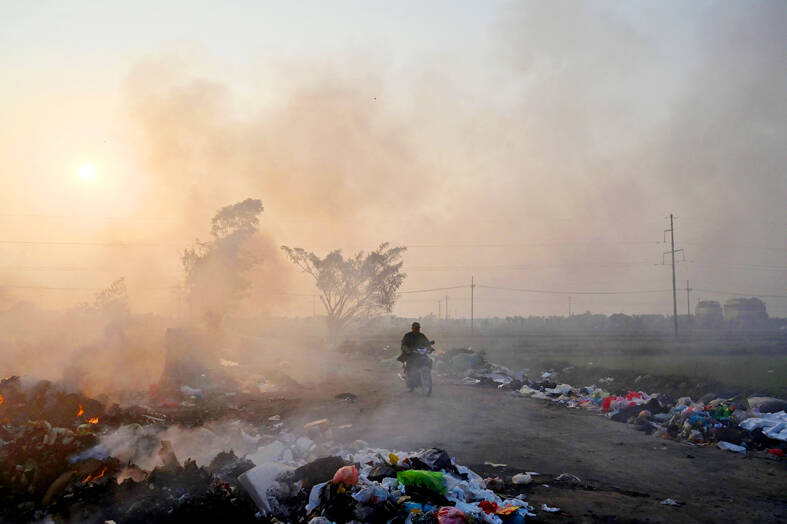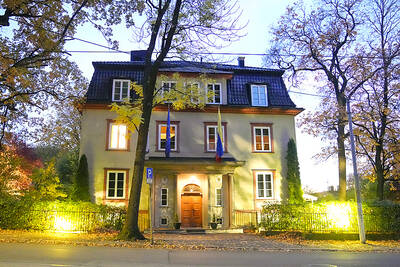Toxic smoke billows from a burning mound of plastic bags and leaves on Le Thi Huyen’s farm in Hanoi, a city battling an alarming air pollution surge that the communist government appears in no hurry to fix.
In the last three months the Vietnamese capital has regularly topped a list of the world’s most polluted major cities, leaving its 9 million residents struggling to breathe and even to see through a thick blanket of smog.
Despite a string of ambitious plans to address the crisis, few measures have been enforced, and there is little monitoring of whether targets are actually achieved, analysts say.

Photo: AFP
Officially, the burning of rice straw and waste was banned in 2022 across the country — but that is news to Huyen.
“I’ve never heard of the ban,” Huyen said.
“If we don’t burn, what should we do with it?” she asked, glancing at her smoldering heap of waste.
The stench of smoke and burning plastic is a constant feature of life in many Hanoi districts.
The country’s poor air quality — which kills at least 70,000 people a year, according to the WHO — is also linked to its coal power plants, the rising number of factories, high usage of petrol motorbikes and constant construction.
Vietnam is a manufacturing powerhouse with a soaring economy, and energy needs to match, but its growth has come at a cost, particularly in its buzzing capital whose geography compounds its air quality woes.
However, unlike in other prominent Asian cities battling pollution, such as New Delhi or Bangkok, life in Hanoi goes on as normal no matter how bad the air. Authorities do not close schools. There is no work-from-home scheme.
The Vietnamese government — which has close links to powerful economic interests, analysts say — has also imprisoned independent journalists and environmentalists who have pushed for faster solutions.
Hanoi has frequently sat at the top of IQAir’s ranking of the world’s most polluted major cities and was rated among the top 10 polluted capitals by the Swiss monitoring company in 2023.
Breathing the toxic air has catastrophic health consequences, with the WHO warning strokes, heart disease, lung cancer and respiratory diseases can be triggered by prolonged exposure.
The World Bank estimates that air pollution — which returned to pre-COVID-19 pandemic levels in 2023 — costs Vietnam more than US$13 billion every year, equivalent to almost three percent of the country’s GDP last year.
“The situation is urgent,” World Bank lead environmental economist Muthukumara Mani, who is based in Hanoi, said.
Even state media, after years of near silence on air quality, has become noticeably vocal in Vietnam, a one-party state.
VietnamNet, the official news site of the Vietnamese Ministry of Information and Communications, published a rare call for action in January, warning air pollution was “a crisis demanding immediate attention.”
Mani said there was recognition of the problem “at the highest level in the country,” citing a trip to China made by senior Hanoi officials to learn how Beijing fixed its once-awful air.
While Hanoi has floated the idea of low-emission zones and devised an action plan that aims for “moderate” or better air quality on 75 percent of days annually, it is not clear whether either would be enforced.
“The issue sometimes with Vietnam is that people pay much more attention to targets than what’s actually being delivered,” said Bob Baulch, professor of economics at RMIT University Vietnam.
Tran Thi Chi had years of breathing difficulties before she made the difficult decision to uproot from the city center house where she lived for more than a decade.
“The air in Hanoi had become so thick that I felt like I didn’t have oxygen to breathe,” said the 54-year-old, one of the first of her friends to buy an air purifier.
However, millions of others have no choice but to live with the noxious air, prompting environmental activists to push for faster change — until authorities launched a crackdown.
Nguy Thi Khanh, founder of GreenID, one of Vietnam’s most prominent environmental organizations, was a rare voice challenging Hanoi’s plans to increase coal power to fuel economic development, before she was jailed in 2022.
Four other environmentalists were also imprisoned in 2022 and 2023.
“This repression has had a chilling effect that has made it virtually impossible for people to advocate for the government to address the problem of air pollution,” said Ben Swanton of The 88 Project, which advocates for freedom of expression in Vietnam.
Chi is fearful for the city she has always loved.
“We need urgent, realistic measures from authorities,” she said. “We have no time to wait around.”

Police in China detained dozens of pastors of one of its largest underground churches over the weekend, a church spokesperson and relatives said, in the biggest crackdown on Christians since 2018. The detentions, which come amid renewed China-US tensions after Beijing dramatically expanded rare earth export controls last week, drew condemnation from US Secretary of State Marco Rubio, who on Sunday called for the immediate release of the pastors. Pastor Jin Mingri (金明日), founder of Zion Church, an unofficial “house church” not sanctioned by the Chinese government, was detained at his home in the southern city of Beihai on Friday evening, said

Floods on Sunday trapped people in vehicles and homes in Spain as torrential rain drenched the northeastern Catalonia region, a day after downpours unleashed travel chaos on the Mediterranean island of Ibiza. Local media shared videos of roaring torrents of brown water tearing through streets and submerging vehicles. National weather agency AEMET decreed the highest red alert in the province of Tarragona, warning of 180mm of rain in 12 hours in the Ebro River delta. Catalan fire service spokesman Oriol Corbella told reporters people had been caught by surprise, with people trapped “inside vehicles, in buildings, on ground floors.” Santa Barbara Mayor Josep Lluis

The Venezuelan government on Monday said that it would close its embassies in Norway and Australia, and open new ones in Burkina Faso and Zimbabwe in a restructuring of its foreign service, after weeks of growing tensions with the US. The closures are part of the “strategic reassignation of resources,” Venezueland President Nicolas Maduro’s government said in a statement, adding that consular services to Venezuelans in Norway and Australia would be provided by diplomatic missions, with details to be shared in the coming days. The Norwegian Ministry of Foreign Affairs said that it had received notice of the embassy closure, but no

A missing fingertip offers a clue to Mako Nishimura’s criminal past as one of Japan’s few female yakuza, but after clawing her way out of the underworld, she now spends her days helping other retired gangsters reintegrate into society. The multibillion-dollar yakuza organized crime network has long ruled over Japan’s drug rings, illicit gambling dens and sex trade. In the past few years, the empire has started to crumble as members have dwindled and laws targeting mafia are tightened. An intensifying police crackdown has shrunk yakuza forces nationwide, with their numbers dipping below 20,000 last year for the first time since records